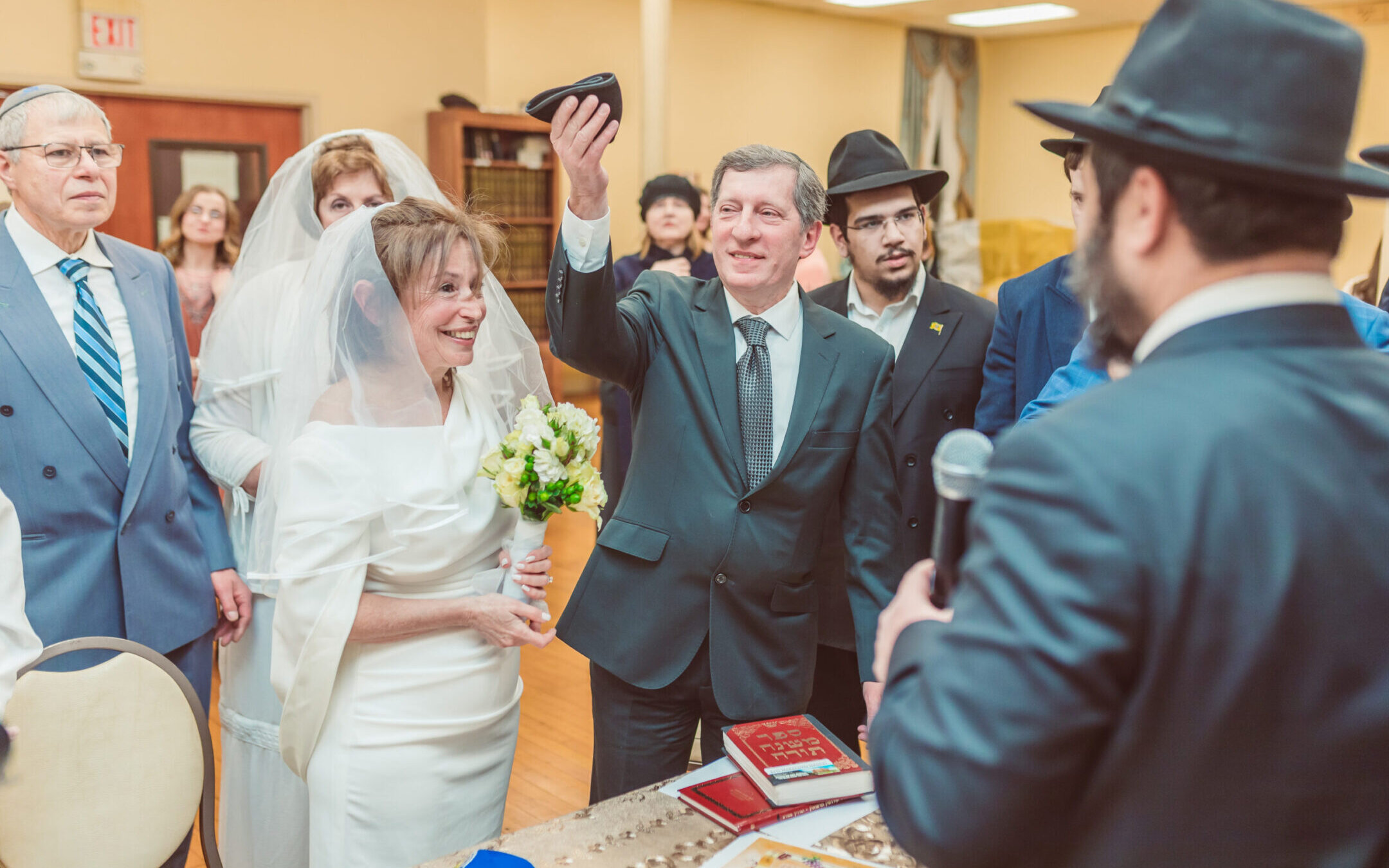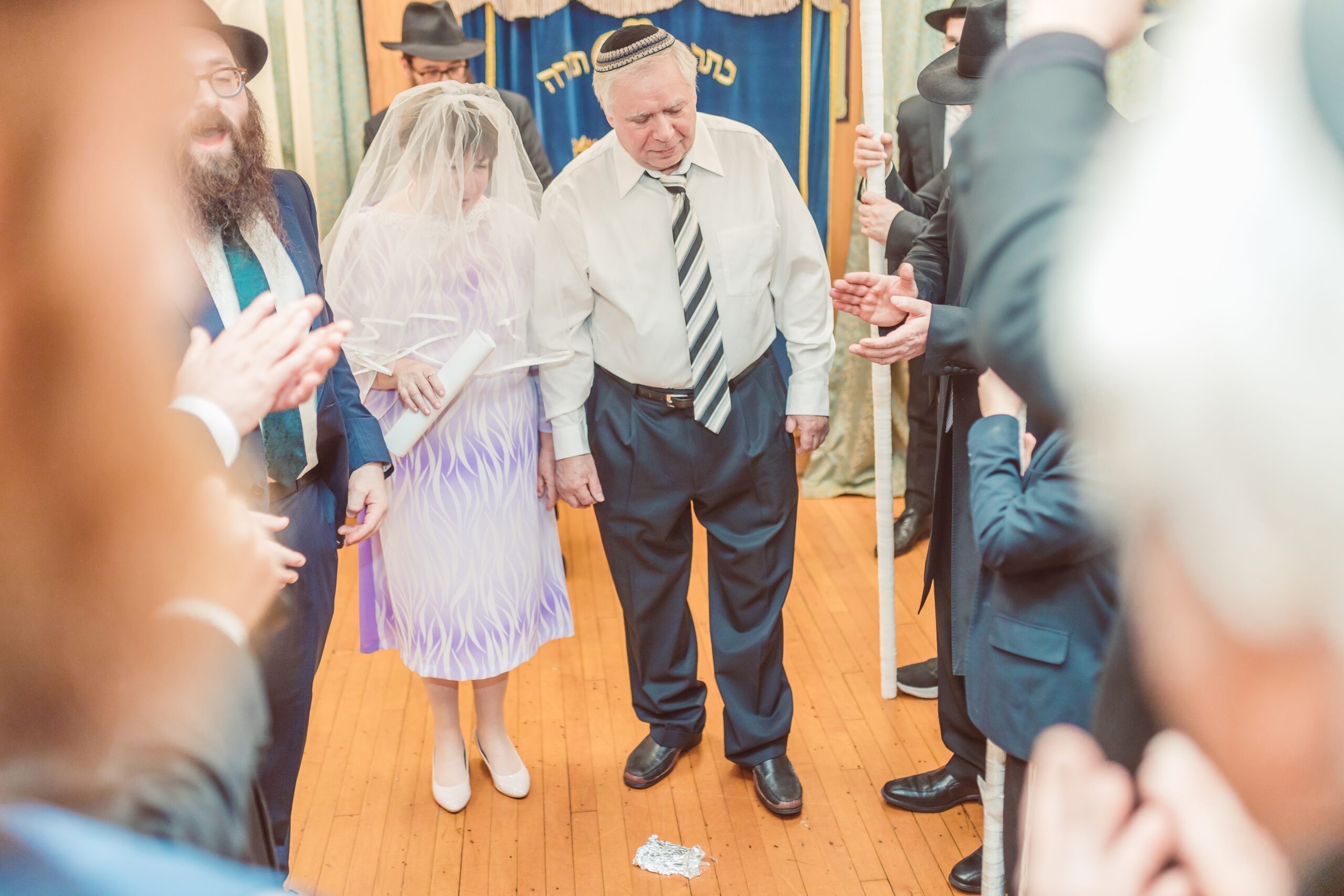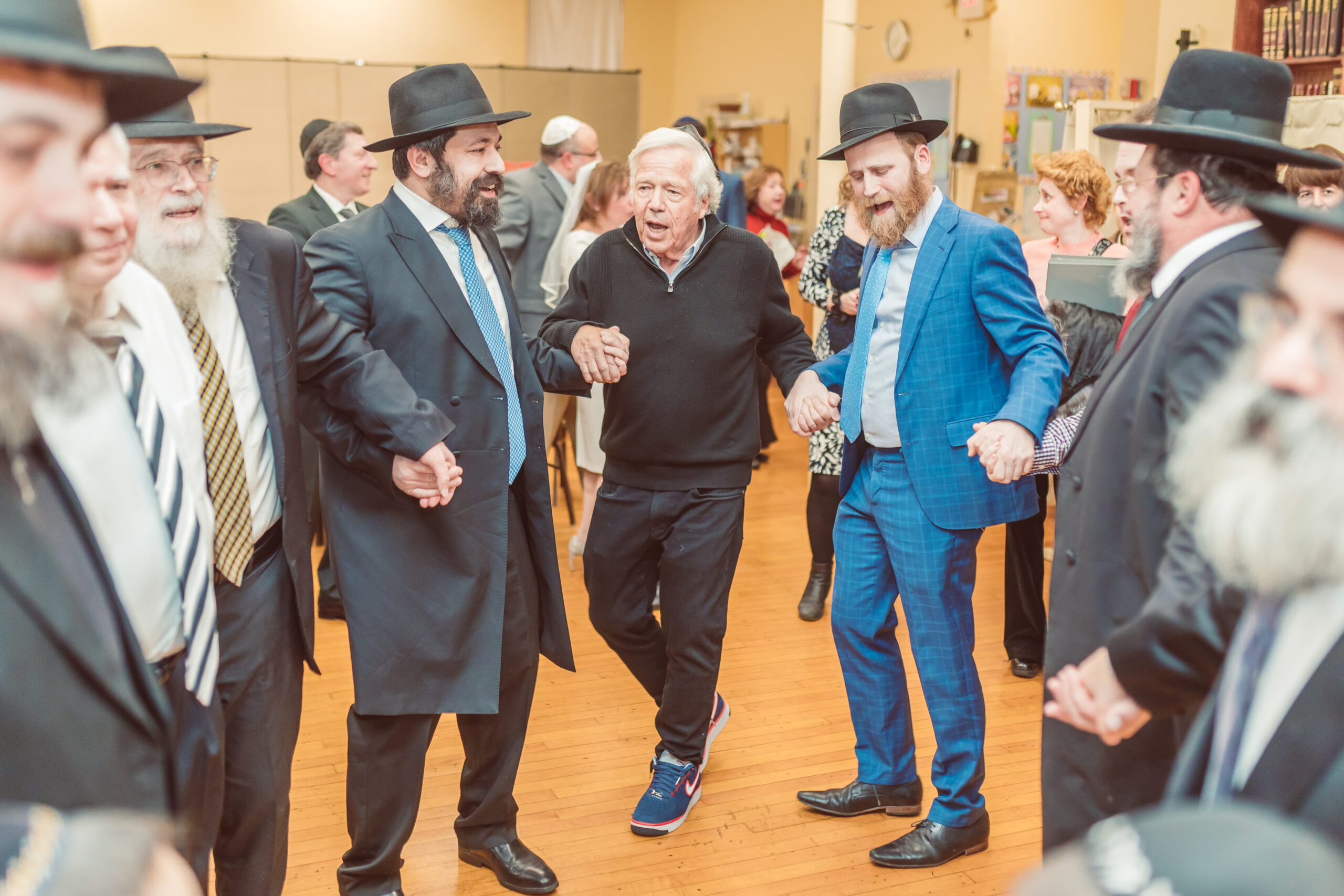They were denied Jewish weddings in the Soviet Union. So these 3 couples just got married again.
“It was my dream for many, many years and dreams come true,” said Elisheva Furman, who first married her husband Fishel in Ukraine 50 years ago

Alex Linkov raises a kippah, in a symbol of a Jewish wedding contract, next to his wife Rimma. The pair had a Jewish wedding in Boston after being married decades earlier in Ukraine. (Photo by Igor Klimov)
BOSTON (JTA) – Veiled brides holding white bouquets; a gold-colored chuppah; the signing of ketubahs, Jewish marriage contracts; lively Jewish music wafting through a social hall as guests danced the hora.
It had all the telltale signs of a traditional Jewish wedding. But the three couples were already married — and had been for a collective total of 125 years.
The event on Wednesday was an opportunity for three Ukraine-born couples to have the Jewish ceremonies they could not have when they first wed, when Jewish practice was forbidden under communism in their country.
“It was my dream for many, many years and dreams come true,” said Elisheva Furman, who first married her husband Fishel in Ukraine 50 years ago.
Held by Shaloh House, a Chabad Lubavitch organization in Boston that serves Jews from the former Soviet Union, the event was also an opportunity for Chabad rabbinical students to practice officiating at Jewish weddings.
Shaloh House launched a rabbinical training institute in 2021, after Rabbi Shlomo Noginski, an educator at the school, was stabbed eight times outside the building in a vicious attack that jolted Boston and especially its Jewish community.
“This wedding ceremony is a victory of love and kindness over oppression and hate,” said Rabbi Dan Rodkin, director of Shaloh House, in a statement. “It is a testament to the strength of the Jewish people and the resilience of these Soviet-born couples, who want to celebrate their union in accordance with their faith and heritage.”
Rodkin himself grew up in Russia. The Chabad movement, which is especially strong in the former Soviet Union, where it was born, has sought to reach Jews from the region whose practices and connection to Judaism were attenuated by living under communism. Shaloh House offers a school, synagogue and community center all focused on Boston’s substantial community of Russian-speaking emigres.
Growing up, despite antisemitic repression, Elisheva and Fishel Furman both said their families maintained a strong Jewish identity and privately observed Jewish holidays. But “it was dangerous” to show their faith in public, said Elisheva, the grandmother of four. So when they got married, they did so only in a civil ceremony.

A couple prepares to step on a glass, a symbol in Jewish weddings, after their Jewish ceremony in Boston, Feb. 7, 2023. (Photo by Igor Klimov)
Their religious ceremony and the two others that took place Wednesday, individualized for each couple, stretched for more than four hours and featured a festive meal and desserts including traditional Ukrainian and Russian foods.
The event took place in the lead-up to the one-year anniversary on Feb. 24, of Russia’s invasion into the couples’ homeland that is under ruthless bombardment that is devastating Ukraine.
Rimma Linkova, who’s been married to Alexander Linkov for 40 years, and one was of the other couples being married, has a cousin still in Ukraine. They talk regularly, she said.
“It’s almost one year of the war and it’s still not ended. It’s very difficult. It’s dying for no reason.” Linkov said.
The third couple was Sofya Hannah and Gedalia Gulnik, who used their Hebrew names.
Yelena Gulnik said she was thrilled to see her parents have a Jewish wedding, something she said her father was initially hesitant to do after so many years of marriage. The mother of three, whose kids attend Shaloh House’s day school, was born in Odessa and came in 1994 with her parents to Boston when she was 12 years old.
“My parents never had a chuppah, they never had a religious ceremony. They were not familiar with many religious Jewish traditions,” Gulnik said. “But it was an amazing opportunity. I don’t think they would have ever done this if Rabbi Rodkin hadn’t offered.”
Being at a wedding for her grandparents is “a little weird since you don’t see it every day,” Yelena’s oldest daughter said. “But it’s certainly exciting.”
Among the attendees were New England Patriots Jewish owner Robert Kraft, and his wife, Dana Blumberg, who themselves were married in November. Kraft, whose Campaign to Combat Antisemitism philanthropy launched in 2019, made a $250,000 donation following the attack on Noginski that helped start the rabbinic program.

New England Patriots owner Robert Kraft dances at a wedding ceremony for Ukrainian couples who did not have Jewish weddings in their native country, Boston, Feb. 7, 2023. Rabbi Shlomo Noginski is on his left. (Photo by Igor Klimov)
“When I saw Rabbi Noginksi getting stabbed in my hometown of Boston, it hurt me,” Kraft told JTA at the wedding.
“This hit close to home, which was shocking to me,” he elaborated in an email response to a question. “It’s an important reminder that antisemitism and hate happens everywhere, even in a community like ours.”
“Since the attack, I have been moved by how Rabbi Noginski has used this horrible incident as an opportunity to raise awareness of the prevalence of antisemitism and the need to stand up to all acts of hatred,” Kraft wrote. “He is a real hero, who not only saved lives that day, but continues to use his experience to educate others.”
Noginski’s personal story has struck a chord for many. As a young man growing up in St. Petersburg, he and his mother experienced antisemitism, eventually leading them to move to Israel. He and his wife, who at the time of the attack had only recently arrived in Boston, have 12 children.
He has added his voice beyond Boston, speaking in Hebrew at a Washington D.C. rally on antisemitism in July 2021, less than two weeks after the attack. His alleged attacker was arrested but has not yet been tried.
But while the attack was in the background at the wedding event, it was not the main focus as the families celebrated together.
“The wedding has enormous meaning,” said Dmitry Linkov about his parents’ ceremony.
He was 5 when his family left Kyiv and settled in Boston. They lived secular lives when he and his younger sister was growing up, he said, but he and his wife, active in Chabad in Chestnut Hill, now embrace more religious practice and observe Shabbat and keep a kosher home.
“What my parents have done tonight will be passed on for generations. It’s a blessing for our future generations,” Dmitry Linkov told JTA.
He hopes the Jewish wedding ceremony inspires other Jews from the former Soviet Union who fled persecution.
“They are celebrating for a nation,” he said. “It’s pretty amazing.”
A message from our Publisher & CEO Rachel Fishman Feddersen

I hope you appreciated this article. Before you go, I’d like to ask you to please support the Forward’s award-winning, nonprofit journalism so that we can be prepared for whatever news 2025 brings.
At a time when other newsrooms are closing or cutting back, the Forward has removed its paywall and invested additional resources to report on the ground from Israel and around the U.S. on the impact of the war, rising antisemitism and polarized discourse.
Readers like you make it all possible. Support our work by becoming a Forward Member and connect with our journalism and your community.
— Rachel Fishman Feddersen, Publisher and CEO


























